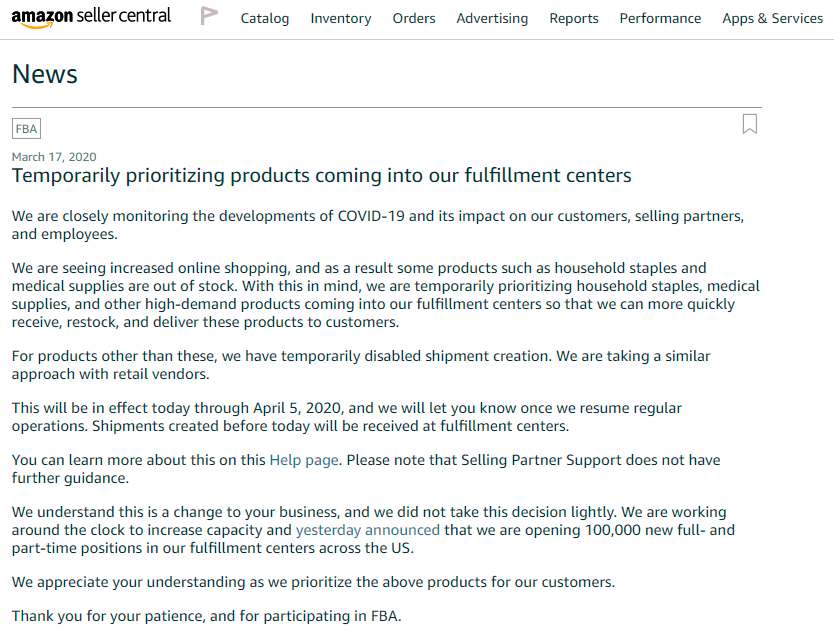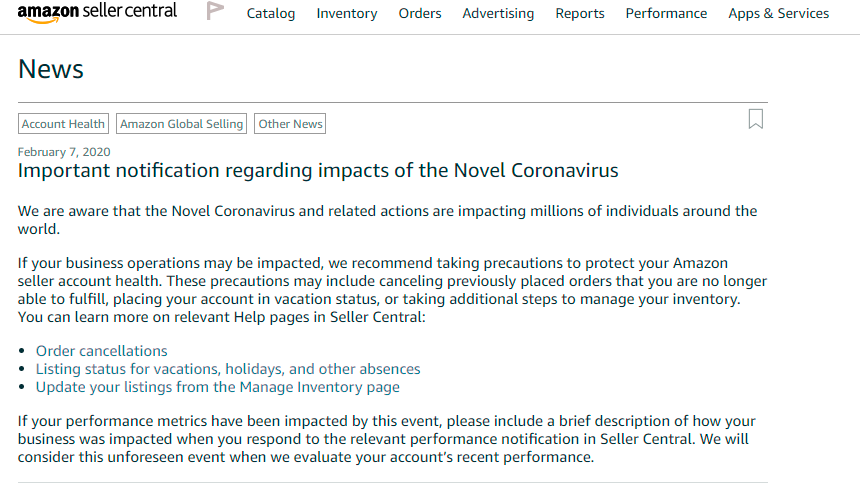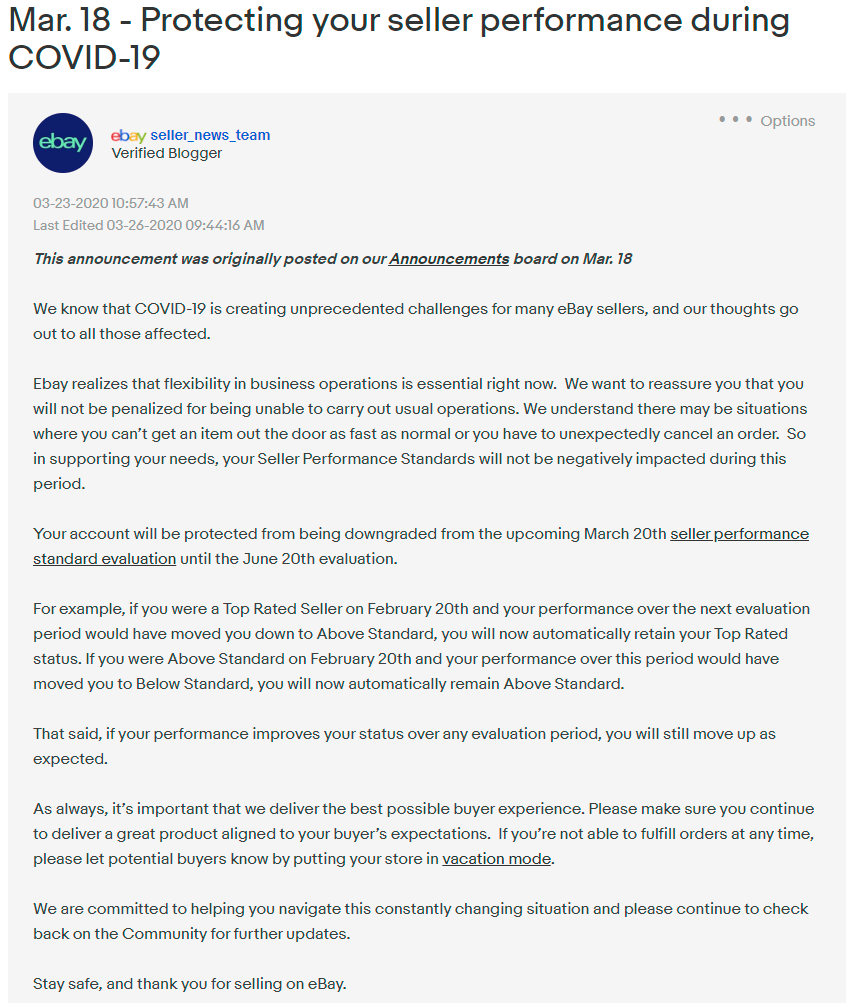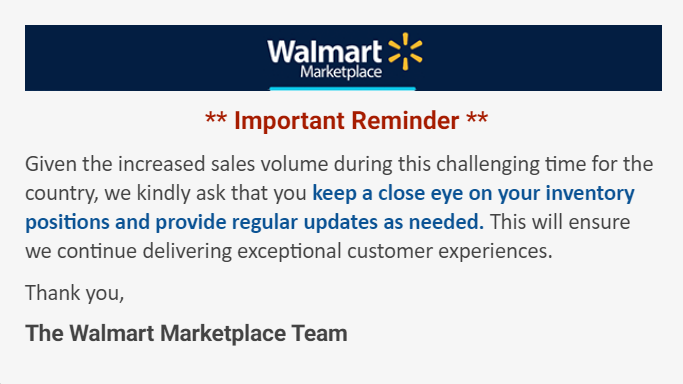Although this is a period of uncertainty for consumers and sellers alike, we have seen an increase in online shopping, at least in certain product categories, as a result of brick-and-mortar stores shuttering their doors during the pandemic. As the crisis continues to develop, we have compiled some of the most recent developments across the eCommerce space, including announcements and policy changes from Google Ads, Microsoft Bing, Amazon, eBay, Walmart, Google Shopping Actions, YouTube, Facebook, Instagram, and Pinterest, as they relate to COVID-19.
Key Data Points from Around the world
- Due to social distancing, online shopping has surged and types of ecommerce are evolving.
- At the inception of the pandemic, factory shutdowns in China and around the world resulted in supply-chain issues and disrupted inventory availability in physical stores and online.
- Recently, factories in China are reopening, though they are still not operating at full capacity.
- The director general of the World Health Organization warned that the US could become the new “epicenter” of COVID-19. As of March 25, the US surpassed China with the most confirmed cases of COVID-19.
- Household items like disinfectant sprays, toilet paper, and hand sanitizer are in still high-demand.
eCommerce Channel Developments
Google Ads
- On March 6, 2020, Google CEO Sundar Pichai published a post on Google’s blog stating that the platform was enforcing its sensitive events policy, by “blocking all ads capitalizing on the coronavirus.” This includes a ban on ads promoting medical face masks. The company has blocked hundreds of thousands of ads, and is facilitating PSA ads for government agencies and WHO.
- Google has also announced that certain forms of seller assistance, like phone support, will have delayed response times and reductions in service.
- Google posted some tips for small businesses to help them adjust to the challenges they might experience due the coronavirus. Tips include suggestions for updating their Business Profile to keep customers in the loop about operating hours, tools for working remotely, and a reminder to adjust ad campaigns and keep customers informed about their shipping capabilities.
Read more about Google updates here.
Microsoft Advertising (Formerly Bing)
- Microsoft has yet to formally announce any ad policy changes in response to COVID-19, however it is likely that they are also limiting advertising attempts to capitalize on the pandemic, like other platforms.
Amazon
- Due to a surge in online shopping, Amazon announced that they would be looking to hire 100,000 new full-time and part-time workers.
- Amazon has not implemented an outright ban on items like face masks and hand sanitizer, but it is monitoring listings for price-gouging on essential items and taking down sellers who they flag in violation of their policies. It is also not accepting new applications for offers in these same categories.
- Amazon FBA is only accepting “household staples, medical supplies and other high-demand products” to its fulfillment warehouses at this time. Current stock, and stock already in transit to their warehouses as of March 17, 2020, will be accepted. This policy is in effect until April 5, as of now.

- In a notice shared on February 7 in Seller Central, Amazon says it will monitor carrier services outages to protect sellers in the event of shipping delays, and recommends canceling orders or putting stores into vacation mode if sellers expect issues with order fulfillment.

- Amazon has also announced that certain forms of seller assistance, like phone support, will have delayed response times and reductions in service.
Read more about Amazon’s updates here.
eBay
- To support sellers during the coronavirus pandemic, eBay is offering to defer seller fees for 30 days for merchants who apply and are approved for the program. Covered fees include “final value fees, insertion fees, store/shop subscription fees, optional listing upgrade fees, and promoted listings fees.” If sellers are approved before their next invoice, then the fees from that invoice will be split 50-50 across the following two monthly invoices instead.
- As of March 6, all listings of health care masks (including N95/N100 and surgical masks), hand sanitizer/gel, and disinfecting wipes were banned from eBay, in an effort to prevent profiteering during the pandemic.
- eBay says it will monitor carrier services outages to protect sellers in the event of shipping delays, and recommends canceling orders or putting stores into vacation mode if sellers expect issues with order fulfillment.
- On March 18, a post on eBay’s Community Announcements page stated that sellers will not be penalized for drops in performance at this time. Sellers will still be rewarded for improvements in performance. See below for a screenshot of eBay’s announcement.

- eBay has also announced that certain forms of seller assistance, like phone support, will have delayed response times and reductions in service.
Read more about eBay’s updates here.
Walmart
- The Walmart Canada marketplace sent a message out to sellers on March 25, 2020, about an upcoming disruption in feed updates. It’s unclear if this is related to COVID-19. Item Feeds will not be updated on Walmart Canada for 16 hours, “(via both Seller Center upload and API) between 8:00 PM EDT (GMT -4hrs) on March 25 and 12:00 PM noon EDT on March 26, 2020.” Price, promotion, and inventory feeds will continue to be updated, but an Item Feed uploads during this time will need to be resubmitted. This disruption as happening as Walmart Canada makes changes to their Shipping Regions.
- Walmart brick-and-mortar hours have been reduced to allow for sanitization and restocking of stores, according to the company. Walmart also continues to monitor seller activity for price-gouging on their marketplace, but has not announced any bans on certain product categories at this time.
- There has been relatively little information about how Walmart US marketplace will respond specifically to COVID-19-related drops in seller fulfillment, but their usual policies do account for “circumstances beyond your control,” and sellers can create a support ticket to appeal any penalization for drops in service.
- Sellers were greeted with the following message in Seller Center on Walmart:

- Walmart has also announced that certain forms of seller assistance, like phone support, will have delayed response times and reductions in service.
Read more about Walmart’s updates here.
Target+ (Target Plus)
- The Target+ marketplace sent out a message to its partners on March 26, with some new announcements.
- In-store returns will be discontinued from March 26 – April 16, 2020. This is being done to protect the health of their store team members. As a result, sellers may receive more mail-in returns or find that customers will wait until after April 16 to return items.
- Target added new required attributes for product catalogs. The initial deadline for updating these attributes was April 8, 2020, but that deadline has been extended to May 6, 2020.Sellers will find settings in the Target+ Portal to indicate closure dates for days when they will not be able to fulfill orders. This will be taken into account on the Estimated Delivery Date that is shown to customers. Sellers should also update their cutoff times for processing orders daily, if they have limited staff. Both these settings can be adjusted by going to Business Info > Shipping Details.
Google Shopping Actions
- Google sent out an email to channel partners on March 18, 2020, recognizing that COVID-19 was putting a strain on supply chains, and offering the following tips for sellers:
- Review Estimated Delivery Date settings often to ensure handling and transit times accurately reflect your current capabilities.
- Ensure offers reflect the true inventory available for Shopping Actions by:
- Using sell_on_google_quantity to specify the number of items available to sell on Shopping Actions
- Using purchase_quantity_limit to limit the number of items available to sell per order
- Or consider using a supplemental feed to manage high demand offers.
- If you receive an order for an item that is oversold, update the item availability and cancel the order immediately using the appropriate reason code of ‘Product Unavailable’ in Merchant Center or ‘noInventory’ via Content API. Do not use the cancellation reason of ‘Other’.
Sellers have the option to pause their stores as needed. To do so, sellers should contact Google Support Team.
If your sellers are unable to complete these actions and need critical assistance, we’ve advised them to contact our support team so that we can help.
- Google announced that they would extend their holiday seller performance standards until June 2020, to account for potential drops in carrier performance as a result of COVID-19. This gives sellers a little more leniency with fulfillment issues.
Facebook and Instagram
- Facebook and Instagram have banned product ads and commerce listings for medical face masks. They will continue to enforce bans on medical products that violate their policies, ads that announce that there is limited stock or exploit a sense of urgency, and ads that promote misinformation surrounding the coronavirus.
- Facebook Marketplace and Instagram will not be penalizing sellers for drops in performance standards at this time—this can be seen on a banner in the Account Health section of Facebook Commerce Manager. Facebook will also be setting expectations with customers, adding language across their sites that advises customers to anticipate delays in shipping as a result of COVID-19.

Read more about Facebook’s updates here.
- According to Buzzfeed News, Pinterest is blocking ads that attempt to capitalize on the coronavirus, engage in price gouging, or “encourage stockpiling.” This includes ads for face masks.
- The platform is also redirecting users to Pins from “internationally-recognized health organizations” when they search for “coronavirus.”

YouTube
- YouTube has started showing videos in Standard Definition by default to limit broadband strain.
- Initially, YouTube was demonetizing all videos about the coronavirus as part of its “sensitive event” policy. This means that ads were not showing on these videos.
- As of March 16, in recognition that the coronavirus pandemic is an ongoing situation, YouTube has begun allowing the monetization of COVID-19-related content for limited channels and news organizations who follow YouTube’s policies and guidelines. More channels will receive notifications that they can monetize coronavirus-related content as time goes on, which means ads will be able to surface on more of these videos.
Read more about YouTube’s updates here.
We are continuing to pay close attention to the ways in which the coronavirus is impacting our partners and sellers. Follow our blog for more useful tips and updates. Though these are unprecedented times, Feedonomics continues to build on its world-class technology and service to help you with a highly optimized data feed and stand out in a crowd.

Brian Roizen is the Cofounder and Chief Architect of Feedonomics, a full-service feed optimization platform that optimizes product data for hundreds of channels. He has been featured on numerous podcasts and eCommerce webinars, and regularly contributes to Search Engine Land and other industry-leading blogs. Brian graduated summa cum laude from UCLA with both a Bachelor’s and Master’s degree in Mechanical Engineering.




